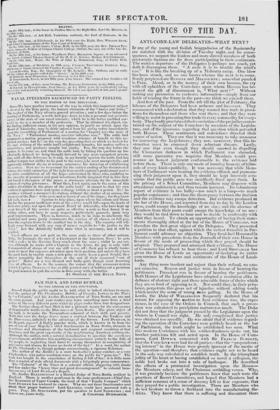NAVAL INTERESTS SACRIFICED TO PARTY FEELING.
TO THE EDITOR OP THE SPECTATOR.
Sin—We have another instance of the way in which this important subject I, treated by the Tory party, the hungry claimants of the "loaves and fishes." The ne.dect of the Navy attracts general attention ; and a few days before the riot:MN:of Parliainent, a noble lord goes down to take a personal and accurate unreev id the state of' our naval arsenals ; which he is the better qualified cm- r..ctit to do, as a member of the profession. That he obtained his object, viz. th.: finding sufficient cause, in his own opinion, to justify an attack upon the llnard of Admiralty, may be thirly inferred from his giving. notice immediately upon the assembling of Parliament of a motion ihr " Inquiry into the state of the Navy." " Parturiunt months, nasectur ritliculus nuts." The noble lord annouuces a motion pregnant with wondrous schemes of benefit to this ne- glected saviee ; but In I on the very day preceding that on which we looked for he so/:• delivery of the nolde lord's enlightened remarks, his motion suffers a misenrriaite, and prodnees nought but smoke. Yes, the very day befiwe the motion is to COML. 1)11, ant when the noble lord, by taking the question up has Actually delayed its being brought forward by any more competent person, (far, with all due deference be it said, in my humble opinion the noble lord has neither temper nor ability to do good to the cause,) he most unexpectedly, and ni -no 7 imily without rhyme or reason, announces his intention of withdrawing Lit motion. now are we to account for the sudden cooling of Ids disinterested ardour, the total extinction of the right honourable captain's professional zeal- t:ie utter annihilation of all the hopes entertained by those who, confiding in the Ancerity of promises and good intentions, fondly imagined that in him they huh limnd a champion of the cause, a strenuous advocate for the hninediate redress of crying grievances. What then, I ask again, can be the cause of this maidu alteration in the plans of the noble lord ? It cannot be that his own OSA ritual opinions have undergone a change within so short a period. No I he saerifices without a moment's hesitation, without the shadow of an excuse, the intere:Is or the N av•• it the mere nod or frown of one of his clique ; for they know
full well, were e tigation to take place, upon whom the odium and blame due for the present inefficient state of the service would fall—upon the beads of' tluir own party, not upon the present Board. of Admiralty, who have kept up
it brutish of the service on quite as effective a scale as they found it on hking office, anti have in many respects, particularly gunnery, made very great improvements. There is, however, much to be done to ameliorate the cendiMm and more justly (-enumerate the services of all (-busses on full pay, us the captain down to the smallest boy in the ship. The country will
uril- u'omtue forward with any sum of money requisite to " do justice to the Let the Admiralty boldly state what is necessary, and, it will he ted.
Nal al officers are not paid on the canto scale RS those of other nations. 'fake, for :example, the case of a Lieutenant in the American Navy : he gets aim/. a year ; in the Bussian Navy much about the same ; whilst in our ser- vice, although he ranks with a Captzlin in the Army, his pay is only I20/. Commanders of sloops of war are still worse oft': their pay is wholly inade- quate to meet the expenses attendant mum their position, and unless they have the good luck to tumble upon a rich prize or carry home me g,00d freight, they almost invariably find themselves at the end of their command " out of pocket." Mates are a very ill-used and badly-paid, though most deserving
r!a:s of officers. As to the seamen, the sooner that the erroneous system (which ('aptaill Moth:ELM" IlaS so ably pointed out) of holding out a premium fur good seamen to quit the service is done away with, the better.
AN OFFICER IN TILE ROYAL NAVY.


























 Previous page
Previous page